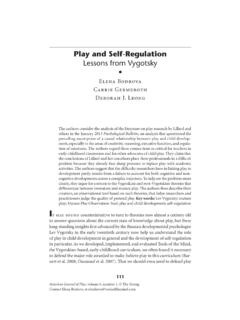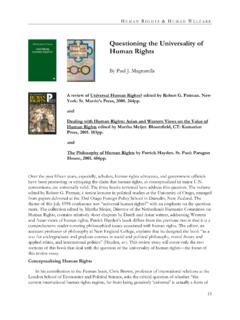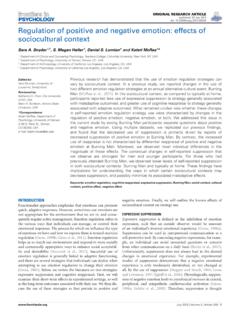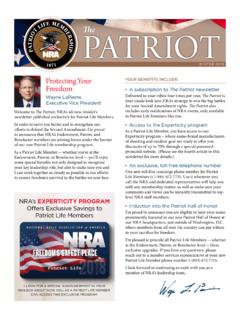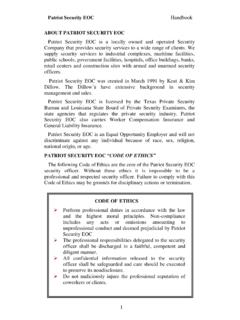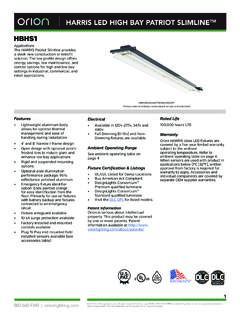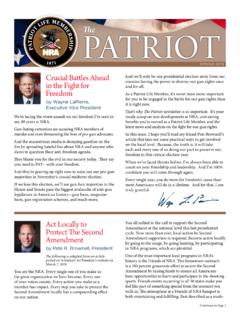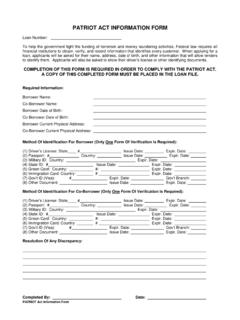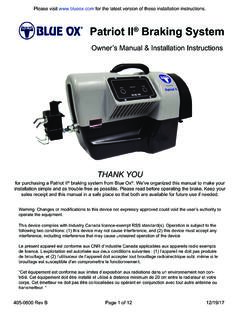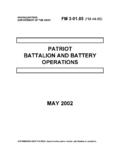Transcription of The USA PATRIOT Act
1 HUMAN RIGHTS & HUMAN WELFARE The USA PATRIOT Act by Toni Panetta The PATRIOT Act had lofty aspirations, for it was designed to correct five perceived weaknesses, or failures, of the national government to prevent the 9/11 atrocity. It sought 1) to improve sharing of information between law enforcement and foreign intelligence agencies; 2) to gather antiterrorism intelligence by taking advantage of the flexible warrants requirement of the Foreign Intelligence Surveillance Act (FISA); 3) to expand wiretap authority over electronic communications; 4) to seize funding utilized in terrorist activities; and 5) to impose mandatory detention and deportation of non-U. S. citizens who are suspected of having links to terrorist organization (Christopher P. Banks. 2004. Protecting (or Destroying) Freedom through Law: The USA PATRIOT Act s Constitutional Implications.
2 American National Security and Civil Liberties in an Era of Terrorism. David B. Cohen and John W. Wells. New York: Palgrave MacMillan). The events of September 11, 2001 serve as the origin of the United States War on Terror as popularized by the Bush administration. Previously, American strategies to combat terrorism focused on attacks against its interests abroad, and support for other governments efforts to curb terrorist acts within their own boundaries. However, September 11 revealed vulnerability to violence by non-state actors within borders. In response, the United States reshaped its anti-terrorist strategies to prevent future attacks by targeting terrorists, foreign and domestic, known and potential. To facilitate the prosecution of terrorists, the United States Congress passed the Uniting and Strengthening America by Providing Appropriate Tools Required to Intercept and Obstruct Terrorism Act, commonly referred to as the USA PATRIOT ACT.
3 Signed into law on October 26, 2001, the Act was enacted to eliminate anachronistic laws that obstructed surveillance and intelligence-gathering activities by government agencies. Since its adoption, debate has raged over how expanded surveillance and intelligence-gathering powers conflict with civil liberties, both in theory and in practice. Much of the literature contained in this bibliography examines the repercussions of the USA PATRIOT Act through the analysis of civil liberties. This reflects the American emphasis on civil and political rights, rather than the compendium of rights recognized by international human rights doctrines. The growing bodies of legal and academic literature on the Act and its implementation reflect this bias. What s Missing It is worth noting that due to the complexity and scope of law dealing with the War on Terror, the PATRIOT Act is just one legal element affecting human rights in the United States.
4 The literature referenced here does not address the issues of executive authority and judicial review, both of which have profound consequences on the legal limits of government behavior and the protection of civil liberties. Moreover, a number of closely related topics have been excluded from this bibliography because they do not relate directly to international human rights doctrines. That said, substantial literature 163 REVIEW DIGEST: HUMAN RIGHTS & THE WAR ON TERROR exists (and continues to grow) in the areas of immigration law and non-citizen detention policies following September 11 that are separate from the PATRIOT Act; financial privacy concerns raised by investigation and prosecution of international money-laundering activities; bioterrorism; and the general conflict between national security and civil liberties. While these topics are referenced in literature included in this bibliography, the resources cited focus specifically on human rights-based civil rights concerns and/or constitutional discussions of the PATRIOT Act.
5 In addition, technical discussions about provisions of the Act dealing with electronic surveillance have been excluded. Literature about electronic surveillance is included to the extent that it contributes to an understanding of constitutional challenges to the Act. Background and Context They that can give up essential liberty to obtain a little temporary safety deserve neither liberty nor safety (Benjamin Franklin). The debate between national security and citizens liberties is centuries old; in America, the most recent iteration of that debate came with the enactment of the USA PATRIOT Act following the terrorist attacks of September 11. This section presents an historical and contextual understanding of the USA PATRIOT Act, with the available literature providing a cohesive foundation to investigate how the Act factors into the debate between security and liberty.
6 Specifically, literature falls into the categories of the PATRIOT act itself, including neutral explanation of the provisions of the Act; historical context of the debate between national security and civil liberties in America; recent anti-terrorism initiatives; human rights concerns within the context of the debate; and foundations for constitutional challenges to the Act. The PATRIOT Act Full and complete text of the USA PATRIOT Act of 2001: http://frwebgate. access. gpo. gov/cgi-bin/getdoc. cgi?dbname=107_cong_public_laws&docid=f: publ056. 107. pdf Howard Ball. 2004. The A. PATRIOT Act of 2001: Balancing Civil Liberties and National Security: A Reference Handbook. Santa Barbara, Calif. : Abc-Clio. Discusses terrorist actions against Americans and government efforts to protect national security before September 11, 2001; passage of the A.
7 PATRIOT Act of 2001; debate over civil liberties endangerment by Act and national security strategies; Bush administration s defense of the Act; and introduction of PATRIOT II. Christopher P. Banks. 2004. Protecting (or Destroying) Freedom through Law: The USA PATRIOT Act s Constitutional Implications. American National Security and Civil Liberties in an Era of Terrorism. David B. Cohen and John W. Wells. New York: Palgrave MacMillan. Provides clear, concise context for passage of the PATRIOT Act, including related legislation and case law upon which provisions of the Act expanded. Provides framework to understand challenges to the Act on First (freedom of association and speech), Fourth (search and seizure), 164 HUMAN RIGHTS & HUMAN WELFARE Fifth (due process and grand jury), Sixth (right to counsel), Eighth (cruel and unusual punishment), and Fourteenth (due process, privacy, and equal protection) amendment grounds.
8 Barbara Dority. 2004. Your Every Move . Humanist. 64(1): 14. Charles Doyle. 2001. Terrorism: Section by Section Analysis of the USA PATRIOT Act. Washington, D. C. : Congressional Research Service. Provides an easy-to-understand description of the USA PATRIOT Act and how it amended pre-existing laws dealing with terrorism, executive authority, financing, and surveillance and investigatory powers. Essential to understand provisions of the PATRIOT Act. Michael T. McCarthy. 2002. Recent Developments: USA PATRIOT Act . Harvard Journal on Legislation. 39(Summer 2002): 435-6. This neutral legal analysis provides a detailed interpretation of the PATRIOT Act and how law changed as a result of its enactment. This well-reasoned piece provides a useful source to understand the Act and criticisms raised by civil libertarians. 2001. Uniting and Strengthening America by Providing Appropriate Tools Required to Intercept and Obstruct Terrorism (USA PATRIOT Act) Act of 2001.
9 John W. Whitehead and Steven H. Aden. 2002. Forfeiting Enduring Freedom for Homeland Security : A Constitutional Analysis of the USA PATRIOT Act and the Justice Department s Anti-Terrorism Initiatives . The American University Law Review. 51(August, 2002). This well-written constitutional analysis of the PATRIOT Act provides intelligible interpretation of how particular provisions of the Act changed law. The article focuses on Fourth, Fifth, and Sixth amendment concerns with the PATRIOT Act and provides a nice background to understand constitutional challenges to the Act. Historical Context of the Debate Richard C. Leone and Jr. Greg Anrig. 2003. The War on Our Freedoms: Civil Liberties in an Age of Terrorism. New York: The Century Foundation. ABSTRACT: A collection of 13 contributed essays that examine the lack of political discourse in America about preserving and protecting civil liberties and questioning government s authority and enactment of various policies under the guise of national security, including the USA PATRIOT Act.
10 Essays of interest discuss historical instances of tensions between liberty and national security; lack of checks on government authority; Guantanamo Bay detainees and detention policies; incursions onto personal privacy; changes in immigration policies and the use of racial profiling following 9/11; increased governmental use of secrecy and reduction in availability of publicly accessible information; the Freedom of Information Act (FOIA) and decline in media coverage and scrutiny of government actions; and attempts to protect individual rights in America via a constitutional challenge to the PATRIOT Act. Paul Rosenzweig. 2004. Civil Liberty and the Response to Terrorism . Duquesne University Law Review. 42(Summer 2004). 165 REVIEW DIGEST: HUMAN RIGHTS & THE WAR ON TERROR Provides a nice summation of the historical tension between civil liberties and security while addressing concerns specific to the PATRIOT Act.



